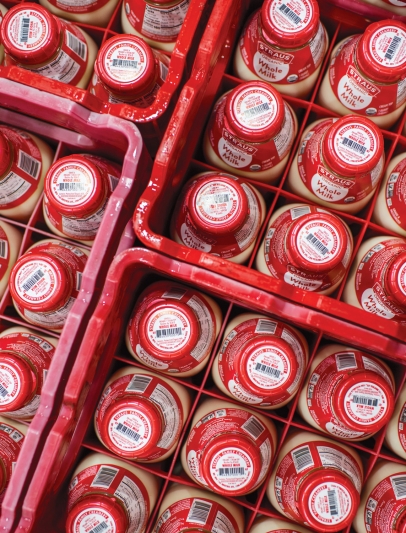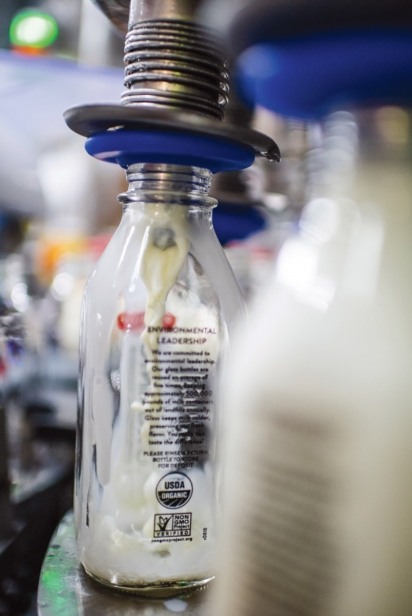Finding Gold in the Waste Bin
STRAUS FAMILY CREAMERY RECEIVES ZERO-WASTE CERTIFICATION
What does a small trash bin tucked in the corner of a Straus Family Creamery executive office have to do with climate change? Everything, according to Stephanie Barger, director of market transformation and development for TRUE (Total Resource Use and Efficiency), a zero-waste certification program established by Green Business Certification Inc. in 2017. The devil is always in the details, and when it comes to reducing what goes into landfill, everybody—every single employee—must be part of the change.
“A company may have too many trash cans, and that also means too many trash can liners,” Barger says. “People get very attached to trash cans in their offices, and to throwing things away. This is a simple fix: When you remove a trash can it’s not only a technical change but it is also a company-wide cultural change, moving toward zero waste.”
Last year, Marin County’s Straus Family Creamery became the first creamery in the world to earn TRUE’s Gold zero-waste certification, and, according to Joseph Button, director of sustainability at Straus, it was this sort of “minutiae” that mattered as the company pursued a critical certification benchmark: Straus now diverts over 90% of its waste away from landfill.
“The TRUE organization requires a very advanced accounting framework of the materials you are managing in your facility,” says Button. “We have 17 different categories of materials we measure and track on a weekly basis, so we can show TRUE on an annual basis that we are still meeting the 90% diversion rate that is required, and that we are avoiding contamination in the recycling.”
The Straus Family Creamery’s total diversion rate from landfill is currently over 92%, which means that out of the 1.135 million pounds of waste it produces annually, 1.05 million pounds is diverted away from landfill. This groundbreaking way of doing business has actually been part of Albert Straus’s vision since he took over management of his parents Bill and Ellen Straus’s family dairy in the 1970s. Although the thick glass bottles of milk and cream have become an integral part of the aesthetic and branding of Straus dairy products, they exemplify a longstanding company ethos.
“Everything we’ve done since the beginning of the creamery was around minimizing our waste,” says Straus, “from reusable glass bottles (we get 75–80% of them returned and they are reused at an average of five uses per bottle), to water reduction (we’ve reduced our water usage by 30% over the last four years), to our methane digester (turning our manure into energy) and, for the last decade, being part of the Sustainable Food Trade Association (tracking and reporting to them every year on our sustainability efforts).”
Straus Family Creamery began in 2018 working toward TRUE zero waste certification, an assessor-based award program that rates facilities based on how well they minimize waste and maximize efficiency in the use of resources. According to TRUE’s website, it is “the first zero-waste certification program dedicated to measuring, improving and recognizing zero waste performance by encouraging the adoption of sustainable waste management and reduction practices that contribute to positive environmental, health and economic outcomes.”
Straus Family Creamery was awarded Gold level certification in the third quarter of 2019, having implemented over 50 zero-waste best practices.
The high rate of diversion from landfill was achieved by “paying very close attention,” says Button, who along with Beatrix Scolari—Straus’s sustainability programs specialist and a certified TRUE zero waste advisor—leads the companywide effort to monitor and reduce waste: down to removing trash cans from individual offices, supplying break rooms with reusable towels, asking employees to bring personal reusable cutlery and flatware to work, and holding regular zero-waste training sessions to educate employees about how to properly sort recyclables and compost food waste.
Button and Scolari recruit volunteers from across all Straus departments to participate in an annual “dumpster dive,” which is exactly what it sounds like: jumping into company dumpsters to examine what has been tossed. According to Button, this is the first step in determining where further improvements are possible.
As anyone who has tried to recycle pizza boxes knows, food contamination is a huge obstacle to recycling. According to Button, some of the most significant challenges Straus faces are due to its being a food manufacturer. Much of their scrap materials become contaminated with food waste, otherwise known as “organic matter.” When organic matter ends up in a landfill, it decomposes anaerobically and generates methane, a greenhouse gas. One example of this issue was when the exterior of approximately one in 50 of Straus’ recyclable plastic yogurt cups was being soiled with yogurt as they moved along the conveyor belt. By fine-tuning just a fraction of an inch, the manufacturing team was able to eliminate the error almost completely and reduce “contaminated” cup waste by hundreds of pounds a week.
“So when I say everyone is involved, it’s not just my office and management, but line operators and our maintenance team all thinking about waste as a resource issue,” says Button.
Recycling failures are also a significant problem for manufacturers. “Any business could just chuck everything in recycling, but to be certified zero waste we must be accountable that everything we put in recycling is actually recyclable,” says Button. The goal is to deliver materials to recyclers in a clean quality format. When materials are mixed up in the recycling bin, recycling center employees must and do pick through the heap to some degree, but depending on the quality of the facility, only 10–50% of the materials are actually recycled.
“At the end of the day, single-stream recycling hurts the recycling economy because of the amount of materials recyclers end up having to throw out,” says Button. Straus invested in a baler so their cardboard is baled before being shipped directly to a recycling entity. They do the same thing with shrink wrap.
“In many ways we are operating our own little recycling facility within our operation. To get to 90% diversion, you have to be doing this.”
The Straus team addressed another tricky obstacle by manually collecting milk bottle caps. In 2018, the company collected more than 18,000 pounds of milk bottle caps that had been recycled. And, according to the creamery’s accounting, the glass bottles that go with those caps keep an estimated 500,000 pounds of milk containers and plastic out of the landfill each year.
But it is not enough to be focused just on what is going out the door. Straus’s Sustainability Department also works to make sure that what is coming into the plant from their vendors is recyclable. If needed, they work with vendors to help them reduce unnecessary packaging or waste.
“It’s amazing how often the industry at large will send you stuff that is unnecessary,” says Button, citing the extra layers of paper between ice cream cups that have now been eliminated. Previously, the egg yolks Straus uses for its ice cream came in reusable plastic buckets with a plastic bag inside. The bag, which is not recyclable, is no longer added. Other innovations include reusable pallet wraps and milk crates, and working with a local packing vendor to move from cardboard boxes to reusable containers.
Paying attention to these myriad small details is no small task, however, and is unlikely to happen without a team dedicated to sustainability efforts. Barger, the TRUE assessor, believes waste management is the Cinderella of sustainability, describing it as “an ugly little thing over in the corner, but when you start uncovering it you find all the inefficiencies in your company and that is really a gold mine.”
The goal is for companies to begin to undertake an accounting of their materials and their sustainability practices—and to take this accounting as seriously as they do in other areas of their business. One of the requirements for TRUE certification is constant improvement over the previous year’s zero waste goals.
The attention Straus has garnered for its innovations in sustainability is already having a ripple effect beyond its own operations. Button recently represented Straus on a panel at a national conference on sustainability, sitting alongside Sierra Nevada Brewing, another renowned sustainability trailblazer. At the conference, Button was approached by one dairy representative who shared that their landfill diversion rate is only around 30%. “It shows how hard it is to achieve zero waste in food manufacturing,” says Button. “But these other brands are encouraged that we were able to do this. These people can say to their colleagues ‘Straus did it; it is not impossible.’”
Albert Straus has spent his career at the helm of Straus Family Farm and Creamery working to show his industry that the “impossible”—protection of the environment and a booming business—is indeed possible. In 1994, Straus became the first 100% organic dairy farm and creamery in the United States. Last year, the company earned the TRUE zero waste certification. The next aspirational goal, says Straus, "is to be carbon neutral on my farm by the end of 2021, and extend this carbon-neutral farming model to our supplier farms by the end of the decade."
“For me, these sustainability hurdles are opportunities,” says Straus. “Innovation and sustainability are part of our core values. Our mission is to support sustained family farms so farmers can thrive. The question is, ‘How can we innovate? How can we do this differently and better?’”






